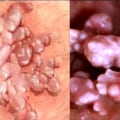Human papillomavirus (HPV) is a common virus that almost all sexually active people will come into contact with at some point in their lives, if they have not been vaccinated. It is responsible for a range of health issues, including genital warts and cervical cancer. There are more than 40 strains of HPV that can affect the genital area. Genital warts, also known as condyloma acuminata, are caused by types 6 and 11 of the human papillomavirus (HPV).
They usually appear as raised bumps on the skin, with parakeratosis and nuclear changes typical of HPV infections (enlarged nuclei with perinuclear elimination).It is important to note that while some types of HPV can cause cervical and anal cancers, these are not the same viral types that cause genital warts. Genital warts can be transmitted through vaginal and anal intercourse, by sharing sex toys, and, rarely, through oral sex. They can also develop in the mouth or throat of someone who has had oral sexual contact with an infected person. Genital warts can be diagnosed visually by a healthcare provider, although a biopsy may be needed to confirm it. DNA testing should not be used for diagnosis or for low-risk HPV infections. The HPV vaccine can protect against certain types of HPV, including those that cause genital warts and certain types of cancer.
An estimated 400,000 people, mostly in their late teens and twenties, contract genital warts each year. Genital warts on the cervix or inside the vagina can cause changes in the cervix (dysplasia) that can lead to cervical cancer. If you have genital warts, your current sexual partners should be tested because they may have warts and not know it.










